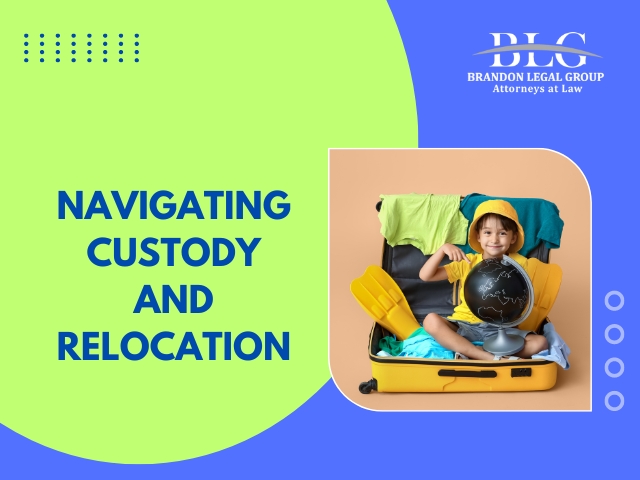When faced with the prospect of relocation, the well-being of your children takes precedence over any other concern. The thought of uprooting their lives and potentially disrupting established custody arrangements can be overwhelming. However, with careful planning and a deep understanding of the legal landscape, it’s possible to navigate these challenges while prioritizing your child’s best interests.
According to a recent study, approximately 1 in 5 child custody cases involve relocation disputes, highlighting the prevalence of this issue in modern families. These situations often arise due to career opportunities, family obligations, or a desire for a fresh start – all valid reasons that must be weighed against the potential impact on the child and the non-relocating parent’s rights.
This comprehensive guide aims to provide invaluable insights and practical advice to help you make informed decisions that prioritize your family’s well-being.
Understanding Custody and Relocation Laws
The laws surrounding these matters vary from state to state, but generally, courts prioritize the child’s best interests when deciding on relocation requests. Factors such as the reason for the move, the impact on the child’s relationship with the non-relocating parent, and the potential benefits or detriments to the child’s overall well-being are carefully evaluated.
It’s crucial to have a clear understanding of the legal framework and the specific laws in your state. Without proper legal representation, you risk making decisions that could jeopardize your parental rights or your child’s well-being.
Preparing a Strong Case for Relocation
If you’re considering relocation, it’s essential to build a compelling case that demonstrates how the move would benefit your child. This often involves gathering evidence and documentation to support your request, such as job offers, educational opportunities, or the availability of family support in the new location.
The following is a DRAMATIZATION AND IS NOT AN ACTUAL EVENT: Let’s say Sarah’s new job opportunity comes with a significant salary increase and better career growth prospects. Additionally, the new location has excellent schools and a vibrant community that could provide her children with enriching experiences. These factors could strengthen her case for relocation.
The use of professionals as expert witnesses, such as child psychologists or family counselors, can also play a crucial role in evaluating the potential impact of the move on the child’s emotional and psychological well-being.
Protecting Your Parental Rights
For non-relocating parents, the prospect of their child moving away can be a source of immense concern. However, the law aims to protect the rights of both parents and ensure that the child maintains a meaningful relationship with each parent, even after relocation.
The following is a DRAMATIZATION AND IS NOT AN ACTUAL EVENT: In Sarah’s case, her ex-husband may be worried about the impact of the move on his relationship with his children. An experienced custody attorney could help negotiate modified visitation schedules or virtual communication arrangements that would allow him to maintain a strong bond with his children despite the distance.
Maintaining a healthy co-parenting relationship throughout the relocation process is crucial for the child’s well-being. An attorney can help navigate these sensitive matters and ensure a fair outcome for all parties involved. Despite the challenges of navigating split households due to custody arrangements, fostering resilience in children can be achieved through consistent love, support, and open communication, helping them adapt and thrive in changing family dynamics.
Seeking Legal Assistance
Custody and relocation matters are complex and emotionally charged. Attempting to navigate them without professional legal assistance can have severe consequences for both you and your child. An experienced custody attorney can provide invaluable guidance and representation, ensuring that your case is presented effectively and that your rights are protected.
By working with a skilled attorney, you can benefit from efficient case management, thorough preparation, and increased chances of a favorable outcome. Their expertise in family law and knowledge of the local courts can make a significant difference in the success of your case.
Frequently Asked Questions
1. How do courts determine the child’s best interests?
Courts consider various factors when determining the child’s best interests, including the child’s emotional and physical needs, the quality of the parent-child relationship, the stability of the home environment, and the ability of each parent to provide for the child’s overall well-being.
2. Can a court deny a relocation request?
Yes, a court can deny a relocation request if it determines that the move is not in the child’s best interests. This decision is based on a careful evaluation of the evidence and testimony presented by both parties.
3. How can an attorney help in custody and relocation matters?
An experienced custody attorney can provide invaluable guidance and representation throughout the legal process. They can help gather evidence, prepare a strong case, negotiate favorable arrangements, and ensure that your rights and your child’s best interests are protected.
Conclusion
Navigating custody and relocation matters can be a complex and emotionally charged journey. However, with the right legal guidance and representation, you can increase your chances of a favorable outcome that prioritizes your child’s well-being and protects your parental rights.
At Brandon Legal Group, our team of experienced custody attorneys understands the nuances of these sensitive matters. We are dedicated to providing compassionate and personalized legal support, ensuring that your case is presented effectively and that your family’s best interests are protected every step of the way.
If you’re facing custody or relocation challenges, don’t hesitate to contact us today at (813) 902-3576. Schedule a consultation, and let us guide you through this process with expertise and sensitivity. Your family’s future is our top priority.
